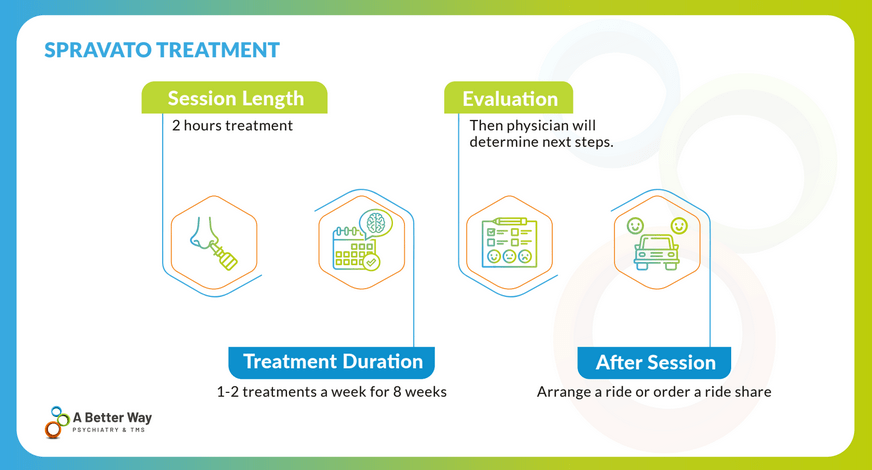Treatment For Depression:
TMS, Spravato, & Antidepressants
Treatment For Depression:
TMS, Spravato, & Antidepressants
TMS, Spravato, and Antidepressants for Depression
Treatment options such as TMS, Spravato and antidepressants for depression and mental health conditions are just a few of the many options for care out there. Over 21 million adults in the United States are impacted by depression, according to the National Institute for Health. Building better access to care and knowledge of treatment options out there can positively impact these staggering statistics:
- 8.3% of U.S. adults experience Major depression.
- Major depression occurs in 10.3% of females and 6.2% males.
- 18.6% of young adults aged 18-25 represent the highest group experiencing major depression.
Traditional antidepressants have been the primary treatment for depression. Selective serotonin reuptake inhibitors (SSRIs) are the most commonly prescribed antidepressants. These medications can ease symptoms of moderate to severe depression and typically cause side effects like insomnia, constipation, sexual dysfunction. SSRIs treat depression by increasing levels of serotonin in the brain. Serotonin is one of the chemical messengers (neurotransmitters) that carry signals between brain nerve cells (neurons). SSRIs block the reabsorption (reuptake) of serotonin into neurons.
Despite antidepressants working for many patients experiencing depression, they are not always effective for everyone. In cases like this, treatments such as Transcranial Magnetic Stimulation (TMS) and/or Spravato may be a good option. If you’re interested to see if these treatment options are a good fit for you or a loved one, book a free consultation with our team today to learn more.
Transcranial Magnetic Stimulation (TMS)
TMS is a non-invasive treatment that uses magnetic fields to stimulate nerve cells in the brain. The magnetic field is generated by a coil that is placed on the patient’s scalp, and it targets the prefrontal cortex, the area of the brain responsible for regulating mood. The treatment typically involves 3-5 sessions per week for eight weeks, however the course of treatment may be different for each individual and their needs.
One of the benefits of TMS is that it is a drug-free treatment with a high success rate. 75% of people who take part in TMS experience improvement or resolution of their depression symptoms. Side effects of mild headache may occur in 20 percent of patients and can be treated with over the counter medication like ibuprofen or acetaminophen. Because TMS is drug-free and non-invasive, it is a simple outpatient process that allows you to return to your daily schedule afterwards.


Spravato (Esketamine)
Spravato (also known as esketamine) has been approved by the FDA since 2019. Spravato works by boosting glutamate in the brain, which helps to improve mood. It is a nasal spray that is self administered in a medical office and a clinician monitors patients for two hours. The first month of treatment is done twice a week for 4-weeks. After that, the frequency is reduced down to one time a week for the next 4 weeks. After week 8, the doctor will determine the next treatments. Spravato can take effect within hours, whereas traditional antidepressant pills typically take two to four weeks before having any impact. Unlike TMS treatments, you will not be able to drive yourself home so you will need to arrange a ride to and from your treatments.
What’s The Difference Between TMS and Spravato?
While both TMS and Spravato are effective treatments for depression, they work in different ways and have different benefits. TMS targets the prefrontal cortex of the brain and is a non-invasive treatment with few side effects. It also has a high success rate. Spravato, on the other hand, works by boosting glutamate in the brain and provides rapid relief from symptoms of depression. It is generally well-tolerated and has fewer side effects than traditional antidepressants. It has a high success rate.
Choosing between TMS and Spravato ultimately depends on your individual needs and preferences. If you are looking for a non-invasive treatment option with a high success rate, TMS may be the right choice for you. However, if you have treatment-resistant depression or have not responded well to traditional medications, Spravato may be a better option.
It’s important to discuss your options with your healthcare provider. At A Better Way Psychiatry &TMS, we can help you determine which treatment is most appropriate for your specific situation and guide you through the treatment process. Contact us to learn more about our TMS vs Spravato treatments.

